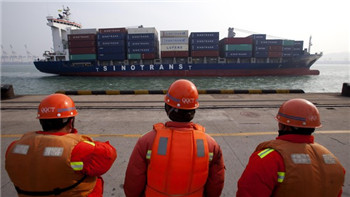(单词翻译:单击)

If Asia really is in the midst of a new currency war, then the hard part will be identifying any winners.
如果说亚洲真的陷于一场新的汇率战争,那么困难的部分将是看出谁是赢家。
A number of analysts billed China’s move to weaken the renminbi last week as an attempt to boost exports by making its products more competitive. Data a few days earlier had shown Chinese exports sinking more than 8 per cent in July, while the real effective exchange rate of the renminbi had just hit a record high.
很多分析师称,中国上周引导人民币贬值是为了使中国的产品更具竞争力,从而促进出口。在那几天前的数据表明,7月份中国出口同比下降8%,而人民币实际有效汇率刚刚创出历史新高。
However, China’s export problem is not simply one of increased international competition — it is also a case of lacklustre global demand. Despite improving economic activity in the US and Europe, exports from across Asia have yet to see a lift, leaving policymakers with scant tools to respond.
然而,中国的出口问题并不只是国际竞争加剧——它也反映了全球需求低迷的现实。尽管美国和欧洲的经济活动正在好转,但亚洲各国的出口还未见任何起色,使政策制定者缺乏应对工具。
China and its neighbours share many of the same challenges. Japan’s poor second-quarter gross domestic product figures were partly due to weak trade, while South Korean exports have been shrinking for the past five months. Shipments from Thailand, Taiwan, the Philippines and Malaysia have all been disappointing this year.
中国及其邻国有着许多相同的挑战。日本糟糕的第二季度国内生产总值(GDP)数据被部分归因于贸易疲弱,而韩国的出口五个月来不断萎缩。泰国、台湾、菲律宾和马来西亚今年以来的出口也都令人失望。
“The argument that China is trying to spur growth by weakening its currency to spur exports does not strike us as very convincing,” said Paul Gruenwald, Standard & Poor’s chief economist for Asia-Pacific, in a report. “Exports are more a function of foreign demand.”
“中国正试图通过削弱人民币来刺激出口、进而刺激经济增长的说法,在我们看来不是特别有说服力,”标准普尔(Standard & Poor’s)亚太首席经济学家龚华德(Paul Gruenwald)在一份报告中表示。“出口在更大程度上是外国需求的函数。”
China is partly to blame. Imports into the country have been falling for much of this year, a sign of declining domestic demand as the economy slows. Car sales growth in China has dropped sharply this year, weighing on the earnings of global automakers.
就此而言,中国需要承担一部分指责。今年以来的大部分时间里,中国的进口都在下降,表明内需在经济放缓之际减弱。今年中国的汽车销量增长大幅下滑,拖累了全球汽车制造商的盈利。
The slowdown in China’s economy has also helped push down global commodity prices, especially those used in heavy industry such as iron ore, copper and oil. That, in turn, has undermined growth in the resource-rich emerging markets that export to China, including Brazil and Russia, both of which are in recession.
中国经济放缓还帮助推低了全球大宗商品价格,尤其是重工业所用的大宗商品,如铁矿石、铜和石油。这进而影响了向中国出口的资源丰富的新兴市场(包括双双陷入经济衰退的巴西和俄罗斯)的增长。
The knock-on effects of the commodity slide have been felt in Asia’s high-end manufacturing economies, notably South Korea and Japan, where cuts to investment by miners and energy producers have hit the large engineering companies that supply drilling platforms and gas storage units used in resource extraction.
大宗商品下滑所产生的连锁效应,波及了亚洲的高端制造业经济体,尤其是韩国和日本。矿商和能源生产企业纷纷削减投资,打击了日韩的大型工程企业,这些企业供应资源开采所用的钻井平台和天然气储存罐。
Better economic performance in the west, particularly the US, has not fed through to stronger demand at Asian factories. Some economists put that down to the changing nature of developed market growth, but the increased importance of trade within emerging markets has been a big drag on headline figures.
西方(尤其是美国)较好的经济表现,并没有给亚洲工厂带来更强劲需求。一些经济学家将此归因于发达市场增长不断变化的特性,但是新兴市场之间贸易的重要性提高,是拖累整体数字的一大因素。
“We’re no longer as dependent on US demand, but that’s now coming back to bite us,” said Fred Neumann, chief Asia economist at HSBC. “Over the next five years, it’s very hard to see exports as the engine of Asian growth.”
“我们不再像以前那样依赖美国的需求,但这一点眼下成了坏事,”汇丰(HSBC)首席亚洲经济学家范力民(Fred Neumann)表示。“很难看到出口将在未来五年里成为亚洲经济增长的引擎。”
Consumer electronics, one of Asia’s main export sectors, has also performed poorly. The long and steady decline of the personal computer industry has been bad news for Southeast Asia, a production base for components such as hard drives, while tablet and smartphone shipments have been weak in the absence of new products and increased competition in the Chinese market from domestic manufacturers.
消费类电子产品作为亚洲的主要出口之一,近来也表现不佳。个人电脑行业持久而稳定的下降趋势,对东南亚(硬盘等计算机组件的生产基地)是个坏消息,而平板电脑和智能手机的出货量在没有新产品、同时中国市场国内厂商竞争加剧的情况下,近期也一直疲软。
After years of rapid credit growth, Asian central banks have been left short of tools to counter the effects of tepid external demand. Interest rates in many countries are already at or near record lows.
多年的信贷快速增长,使亚洲各国央行缺乏工具来对抗低迷外部需求的影响。很多国家的利率已经处于(或者接近)创纪录低点。


